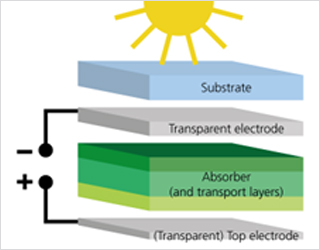The Fraunhofer FEP offers innovative technologies and solutions in the field of energy and sustainability that contribute to increasing efficiency and conserving resources.
In the field of photovoltaics, the institute develops advanced coating processes to optimize solar cells and modules. For hydrogen technology, precise thin-film depositions for electrolysers are used to increase the efficiency of hydrogen production. We also develop customized coatings for battery technologies to improve the performance and service life of energy storage systems. The Fraunhofer FEP is also working on intelligent solutions for energy management to support sustainable and efficient energy systems.
 Fraunhofer Institute for Electron Beam
Fraunhofer Institute for Electron Beam



